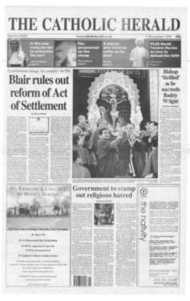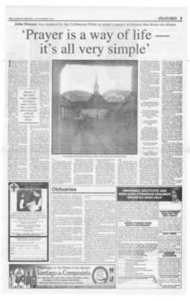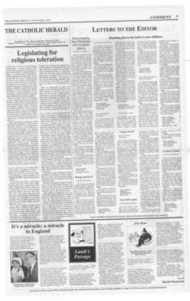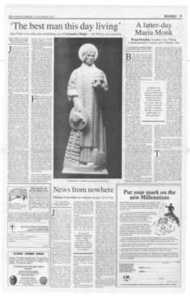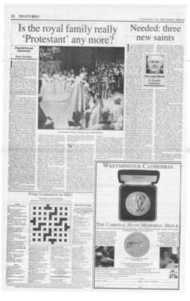Page 1, 5th November 1999
Page 1

Report an error
Noticed an error on this page?If you've noticed an error in this article please click here to report it.
Tags
Share
Related articles
Blair Rejects Scots Bid To Reform Act Of Settlement
Reform Hope For Caholics
Scrap The Act Of Settlement, Says Anglican Leader
Senior Mp: I Doubt A Catholic Can Be Pm
Parliament Debates Monarchy Bill
Blair rules out reform of Act of Settlement
By Simon Caldwell TONY BLAIR has refused to change the law that forbids a British monarch to either marry or become a Catholic. In response to calls from a crossparty group of Scottish politicians, the Prime Minister announced he had no plans to repeal the controversial 1700 Act of Settlement.
And in reply to a letter from Lord James Douglas-Hamilton, Conservative MP for Lothian, the reforming Prime Minister said the Act had wide-ranging constitutional implications for the United Kingdom and the Commonwealth. 'The Government is conscious that this is a subject on which both Catholics and non-Catholics have deeply held views which need to be treated with respect," explained Mr Blair.
"Any attempt to amend the Act would in any case be complex in the extreme, as at least eight other pieces of legislation, some prior to the Acts of Union with Scotland and Ireland, would also have to be amended or repealed. Moreover, in order to avoid any disputes over the succession, identical legislation would need to be passed by at least 15 other independent monarchies within the Commonwealth." The remaining provision against Catholics was No action: the PM's letter among a number of harsh penal measures introduced in the years after the bloodless coup of 1688 in which the Stuart King James II, a Catholic, was usurped.
Most of the penal laws were repealed during the Catholic Emancipation of 1829 but the Act continues to make the monarch the supreme governor of the established Church of England and excludes Catholics from the line of succession.
Catholic-educated Lord James, a member of the Church of Scotland, has pledged to continue his campaign. He called the Act an 18th century anachronism "totally out of line with the socially-inclusive multi-faith community which the Government professes to believe in".
He said: 'The Government is not prepared to act. It would seem that a combination of fear, ultra-caution, legislative complexity and inertia would have Tony Blair's regime adopt a 'do-nothing' policy with the result that this unfair and unjust anomaly is to continue. As matters stand under the law, the married partner could be a Christian of any other faith, a Muslim, Hindu, Buddhist, scientologist, atheist, a Moonie or even a sunworshipper but not a Catholic.
"This intolerant and harsh provision is not readily reconciled with that of the modern, with-it, cool Britannia for the new millennium, in-the-heartEurope Britain so beloved of the Prime Minister. I am appalled that with such a huge House of Commons majority, he has chosen to address this injustice with indecision."
Cardinal Winning said in September that he was "greatly heartened" by the calls for change, adding that an amendment would show that Catholics "can, should and do play a full and equal role in national life".
He said: "I do not think that any fair-minded person could defend the Act of Settlement as it is currently formulated since it quite crudely discriminates against Catholics as such. It is, in short, something of an embarrassing anachronism for both the royal family and Parliament" Editorial Comment—p7 Brian Brindley—p12
blog comments powered by Disqus


